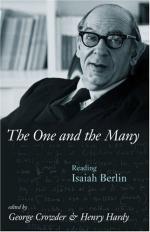|
This section contains 4,551 words (approx. 16 pages at 300 words per page) |

|
SOURCE: “When A Sage Dies, All Are His Kin,” in The New Republic, Vol. 217, No. 217, December 1, 1997, pp. 27-31.
In the following eulogy, Wieseltier enumerates the qualities which, he asserts, made Berlin a sage.
I.
“When a sage dies,” says the Talmud, “all are his kin.”
The rabbis were speaking practically, not philosophically. They were ruling that, when a sage dies, everyone must observe some of the practices of mourning. When a sage dies, for example, all must rend their garments. “But do you really think that all are his kin?” the text asks itself, incredulously. For all are obviously not his kin. It is a big world. The injunction seems sentimental, onerous. “So say, rather, that all are like his kin.” A distinction! But it is not enough of a distinction to release anybody from the duty to mourn.
And if you never knew the man, if you...
|
This section contains 4,551 words (approx. 16 pages at 300 words per page) |

|


